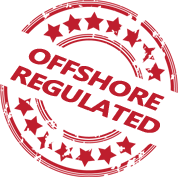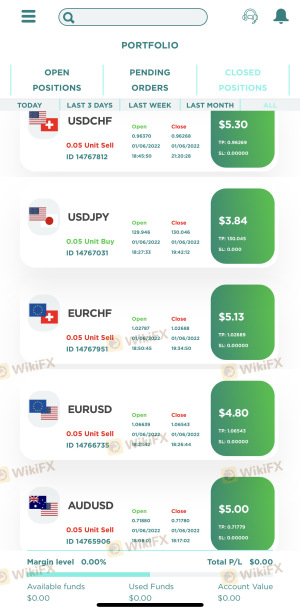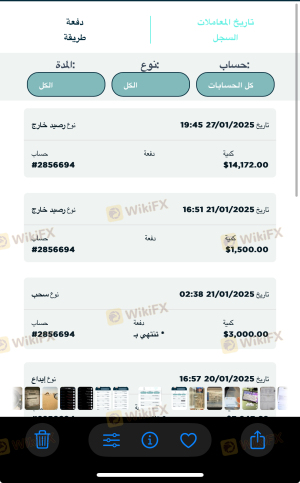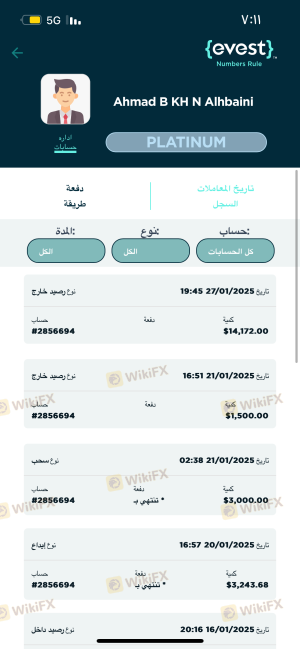Regarding the legitimacy of evest forex brokers, it provides FSCA, VFSC and WikiBit, .
Is evest safe?

Pros
Cons
Is evest markets regulated?
The regulatory license is the strongest proof.
FSCA Forex Trading License (EP)
Financial Sector Conduct Authority
Financial Sector Conduct Authority
Current Status:
RegulatedLicense Type:
Forex Trading License (EP)
Licensed Entity:
ATRIAFINANCIAL SA (PTY) LTD
Effective Date:
2008-09-09Email Address of Licensed Institution:
--Sharing Status:
No SharingWebsite of Licensed Institution:
--Expiration Time:
--Address of Licensed Institution:
3RD FLOOR34 WHITELEY BLVDMELROSE ARCH2196Phone Number of Licensed Institution:
010 020 1885Licensed Institution Certified Documents:


VFSC Forex Trading License (EP)
Vanuatu Financial Services Commission
Vanuatu Financial Services Commission
Current Status:
Offshore RegulatedLicense Type:
Forex Trading License (EP)
Licensed Entity:
ATRIAFINANCIAL LIMITED
Effective Date: Change Record
2023-12-11Email Address of Licensed Institution:
--Sharing Status:
No SharingWebsite of Licensed Institution:
--Expiration Time:
--Address of Licensed Institution:
--Phone Number of Licensed Institution:
--Licensed Institution Certified Documents:


Is Evest A Scam?
Introduction
Evest is a forex and CFD broker that has garnered attention in the trading community since its establishment in 2021. With its headquarters in Vanuatu and South Africa, Evest claims to offer a wide range of financial instruments, including forex, commodities, and stocks, to traders worldwide. However, the rise of online trading has also led to an increase in fraudulent activities, making it imperative for traders to carefully evaluate any broker before committing their capital. In this article, we will assess the safety and legitimacy of Evest by examining its regulatory status, company background, trading conditions, customer fund security, user experiences, platform performance, and overall risk profile. Our investigation is based on a thorough review of multiple sources, including user feedback, regulatory databases, and industry analyses.
Regulation and Legitimacy
Evest operates under the regulation of the Vanuatu Financial Services Commission (VFSC) with the license number 17910 and claims to have additional oversight from the Financial Sector Conduct Authority (FSCA) in South Africa. However, the VFSC is known for its relatively lenient regulatory framework, which raises questions about the level of investor protection afforded to clients. The following table summarizes Evest's core regulatory information:
| Regulatory Authority | License Number | Regulatory Region | Verification Status |
|---|---|---|---|
| VFSC | 17910 | Vanuatu | Verified |
| FSCA | 36060 | South Africa | Suspicious Clone |
The lack of a license from a top-tier regulatory body such as the UKs Financial Conduct Authority (FCA) or the Australian Securities and Investments Commission (ASIC) is a significant red flag. These regulators impose stringent requirements, including client fund segregation and negative balance protection, which are crucial for safeguarding traders. The VFSC's oversight is often viewed as insufficient, and the FSCA's license is suspected to be a clone, further complicating Evest's credibility.
Company Background Investigation
Evest is operated by Atria Financial Ltd, a company that has been registered in multiple jurisdictions, including Vanuatu and South Africa. While the broker's website claims to have a transparent ownership structure, the details about the management team and their professional backgrounds are sparse. This lack of transparency raises concerns about the broker's accountability and reliability.
The company's development trajectory shows that Evest was launched to cater to the growing demand for trading services in the MENA region. Despite its rapid growth, the absence of concrete information regarding the management teams qualifications and experience is troubling. A well-informed management team is essential for a broker's operational integrity and customer service, and the lack of such information can lead to doubts about the broker's reliability.
Evest's transparency regarding its operational practices and financial disclosures is also limited. Clients often look for brokers that provide comprehensive information about their business practices, including how client funds are managed and the risks involved in trading. In this case, Evest's vague disclosures may deter potential clients who seek reassurance and clarity before investing their funds.
Trading Conditions Analysis
Evest's trading conditions are a critical aspect of its overall appeal to traders. The broker offers a variety of account types, including Silver, Gold, Platinum, and Diamond accounts, with a minimum deposit starting at $250. However, the overall fee structure and trading costs associated with these accounts warrant scrutiny.
The following table compares Evest's core trading costs with industry averages:
| Fee Type | Evest | Industry Average |
|---|---|---|
| Spread on Major Currency Pairs | 2 - 3 pips | 1 - 1.5 pips |
| Commission Model | No commissions | Varies by broker |
| Overnight Interest Range | High (negative swaps) | Varies by broker |
Evest's spreads, particularly on major currency pairs, tend to be higher than the industry average, which can significantly impact trading profitability. Additionally, the broker implements various fees, including a $5 withdrawal fee and a steep inactivity fee of $75 after two months of inactivity. Such fees are often considered excessive compared to industry standards, where many brokers do not charge inactivity fees at all.
The absence of a transparent commission structure may also be a concern for traders who prefer to understand the total costs associated with their trades. Overall, while Evest claims to offer competitive trading conditions, the reality appears to be less favorable, potentially leading to higher trading costs for clients.
Customer Fund Security
The safety of client funds is paramount in the trading industry. Evest claims to implement various security measures, including the use of SSL encryption to protect client information and funds. However, the effectiveness of these measures is questionable, especially given the broker's offshore regulatory status.
Evest does not participate in any compensation schemes that would protect clients in the event of insolvency or operational issues. Additionally, the broker does not provide negative balance protection, which can expose traders to significant financial risks, particularly in volatile market conditions.
The following table summarizes Evest's fund security measures:
| Security Measure | Evest | Industry Standard |
|---|---|---|
| Client Fund Segregation | No | Yes |
| Negative Balance Protection | No | Yes |
| Compensation Scheme | No | Yes |
The lack of these essential safety features raises serious concerns about the security of client funds with Evest. Traders should be especially cautious when dealing with offshore brokers that do not have robust safety measures in place.
Customer Experience and Complaints
Customer feedback is a vital indicator of a broker's reliability and service quality. Evest has received mixed reviews from users, with many expressing dissatisfaction regarding customer support and withdrawal processes. Common themes in complaints include delays in fund withdrawals, unresponsive customer service, and issues with account verification.
The following table outlines the primary complaint types associated with Evest:
| Complaint Type | Severity Level | Company Response |
|---|---|---|
| Withdrawal Delays | High | Slow response |
| Poor Customer Support | Medium | Unresolved issues |
| Account Verification Issues | High | Lengthy process |
Several traders have reported difficulties in accessing their funds after submitting withdrawal requests, with some claiming that the broker imposed unreasonable conditions for processing withdrawals. These issues highlight potential operational inefficiencies and a lack of adequate support for clients facing challenges.
For instance, one user reported a frustrating experience where their withdrawal request was delayed for weeks, and they received little to no communication from the support team. Such experiences can significantly undermine trust in a broker and may deter potential clients from opening accounts.
Platform and Trade Execution
Evest offers a proprietary web-based trading platform along with support for MetaTrader 5 (MT5). While MT5 is widely regarded as a robust and feature-rich trading platform, the performance and reliability of Evest's proprietary platform have been questioned by some users.
Traders have reported experiencing issues with order execution speed, slippage, and occasional rejections of trades. These factors can severely impact a trader's ability to capitalize on market opportunities and manage their positions effectively.
The following aspects summarize the platform's performance:
- Execution Quality: Users have noted that order execution can be slow during periods of high volatility, which may lead to unfavorable pricing.
- Slippage: Several traders reported instances of slippage, particularly during major market events, which can erode profits.
- Platform Stability: While MT5 is generally stable, some users have experienced connectivity issues with Evest's proprietary platform, leading to interruptions in trading activities.
Overall, the quality of the trading platform and execution can significantly influence a trader's experience, and potential clients should weigh these factors when considering Evest.
Risk Assessment
Engaging with Evest presents several risks that traders should carefully evaluate. The following risk assessment table summarizes the key risk areas associated with trading through this broker:
| Risk Category | Risk Level (Low/Medium/High) | Brief Explanation |
|---|---|---|
| Regulatory Risk | High | Offshore regulation with limited oversight. |
| Fund Security Risk | High | Lack of client fund segregation and no compensation scheme. |
| Customer Service Risk | Medium | Reports of poor support and unresolved complaints. |
| Market Risk | Medium | High leverage can amplify both gains and losses. |
To mitigate these risks, traders should conduct thorough research, maintain a diversified portfolio, and consider using risk management tools such as stop-loss orders. Additionally, it may be wise to limit exposure to high-risk trades and avoid investing more than one can afford to lose.
Conclusion and Recommendations
In conclusion, while Evest presents itself as a viable trading option with a range of financial instruments and educational resources, significant concerns regarding its regulatory status, customer fund security, and user experiences cannot be overlooked. The absence of robust regulatory oversight, coupled with reports of withdrawal issues and poor customer support, raises red flags about the broker's reliability.
For traders seeking a trustworthy and secure trading environment, it is advisable to consider alternatives that are regulated by reputable authorities such as the FCA or ASIC. Reputable brokers typically offer better investor protection, customer service, and trading conditions.
In summary, potential clients should approach Evest with caution and conduct thorough due diligence before investing their funds. Exploring well-established brokers with a proven track record may provide a safer and more reliable trading experience.
Is evest a scam, or is it legit?
The latest exposure and evaluation content of evest brokers.




evest Similar Brokers Safe
Whether it is a legitimate broker to see if the market is regulated; start investing in Forex App whether it is safe or a scam, check whether there is a license.
evest latest industry rating score is 5.23, the higher the score the safer it is out of 10, the more regulatory licenses the more legitimate it is. 5.23 If the score is too low, there is a risk of being scammed, please pay attention to the choice to avoid.
